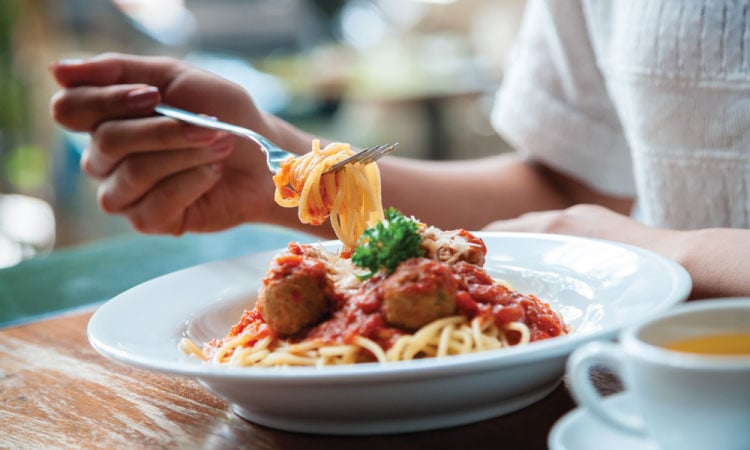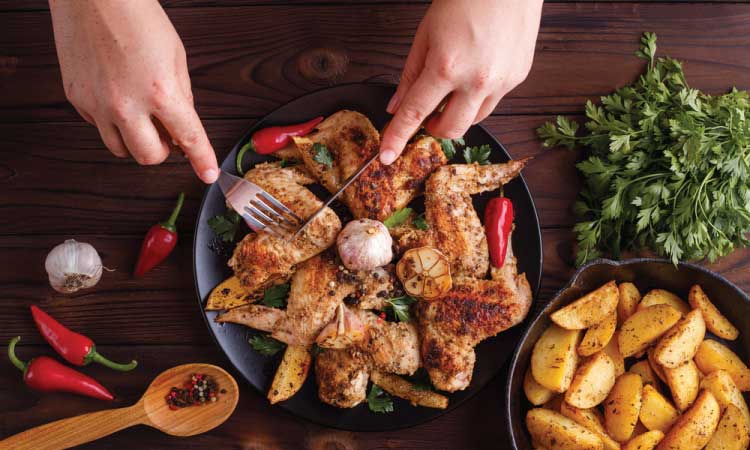There are some questions that plague every new mother’s mind, and they aren’t new. If you are a fan of ‘masaledar’, spicy food, you might be wondering if your food habits warrant a change now that you are a mother. Can I eat spicy food when breastfeeding? Do spicy foods upset a breastfed baby? Is it safe for me to eat spicy food soon after delivery?
The query continues in many mothers’ forums- What are the signs that my food intake is harming my baby? How do I know what is safe or not? Can the taste of the food I eat affect the breast milk I feed my child?
Here we try to shed some light on having spicy food during breastfeeding.
Is It Safe To Eat Spicy Food During Breast Feeding?
Long story short, yes, you can absolutely eat spicy food when breastfeeding your child.
There is a lot of misinformation and uncertainty regarding spicy food and breastfeeding. New mothers almost instinctively avoid their favorite curries and meats, fearing it would affect the infant in a negative way.
However, there is no proof that spicy food when breastfeeding upsets a breastfed baby. In fact, several cultures around the world have spicy foods as part of their daily menu and have not experienced any negative effects due to the same.
It is also entirely possible that your baby is already familiar with the taste of spicy food if you consumed them during your pregnancy. This is because such foods can change the taste of the amniotic fluids your baby was surrounded by in the womb.
Related Reading: 9 Biggest Challenges Of Breastfeeding No One Prepares You For
Many mothers begin consuming spicy food in small amounts shortly after giving birth. It is recommended that you wait until your child is fully accustomed to breastfeeding and comfortable with it before you take this step and introduce them to such tastes.
While strong tastes like that of spicy foods and garlic can affect the taste of breast milk, this does not harm the baby in any way. On the other hand, studies have shown that this can help introduce the baby to new tastes, making it easier for you to get them to eat different dishes later on.
How Long Does It Take For Spicy Food To Pass Into Breast Milk?

As each body is different, the answer to this question varies from mother to mother. On average, it takes about 4 to 6 hours for the food to metabolize and for the flavor to reach your breast milk. However, it can take anywhere from one hour to a whole day, depending on your body chemistry. Keep this in mind while you eat spicy food when breastfeeding.
How Long Does Spicy Food Stay In Breast milk?
Again, this entirely depends on your metabolism and body chemistry. As every mother is different, it would be impossible to give an entirely accurate estimate. However, most commonly in studies, the taste of the food you eat peaks in the milk about 1-3 hours after ingestion.
If you want to know more about this to alleviate your fears, the best thing for you to do is to contact your doctor and discuss it with them.
Related Reading: 11 Home Remedies For Acid Reflux During Pregnancy
How Long After Eating Spicy Food Can I Breastfeed?
Since spicy food does not usually unsettle the child in any way, there is no regulation needed on this aspect. So, you can breastfeed your baby as soon after eating spicy food, or as late as you want, as long as you feed the baby the needed amount.
Myths Around Eating Spicy Foods When Breastfeeding
It is common for mothers to restrict their diet to a blander menu when they start breastfeeding. This is oftentimes due to myths around eating spicy foods when breastfeeding. Maybe you have a faint feeling that it is bad, maybe the mothers and grandmothers in your family advise you to restrict your intake of spices post delivery.
Either way, many women believe that eat spicy food when breastfeeding is not good for your baby. However, this is mostly false. Of course, there are exceptions where either the mother or the baby may develop some food allergies, but the vast majority of infants do not experience any ill effects when mothers eat spicy food when breastfeeding.
It is important to educate young mothers on this topic. Many stress over how what they eat negatively impacts their little one, when most of the time, this fear is entirely unwarranted.
Related Reading: Foods To Avoid During Breastfeeding
Possible De-Merits Of Eating Spicy Food While Breastfeeding

When mothers eat spicy food when breastfeeding, there can be some cons as well. Sometimes, children can develop a spice allergy, or sensitivity, or a dislike toward such foods. They might experience digestive issues or even some pain in their abdomen.
Although newborns commonly experience such tummy aches, it is rarely due to the mother eat spicy food when breastfeeding, and there are measures you can take to ensure these issues are avoided. Monitor your child closely if they portray any of the following symptoms:
- The baby crying and fussing soon after drinking spicy milk should be your first clue.
- Diarrhea, or otherwise irregular bowel movements after drinking spicy milk
- Rashes, hives, or some other similar blemish on the baby’s skin
- Refusal to feed
- Inconsistent sleep cycle
- Wheezing or congestion
- Vomiting or puking up the milk soon after they drink it
- Gassiness
If your little one experiences any of these signs, and you suspect it is due to consuming spicy food when breastfeeding, it is time to give your pediatrician a call.
Merits Of Eating Spicy Food When Breastfeeding
Now that you know the cons of eating spicy foods when breastfeeding, it is imperative that you know the merits too to make an informed choice.
1. Better transition into solids
Spicy foods, and other food with strong tastes like garlic, will cause a small amount of the taste to seep into the breast milk. Studies have shown that milk with such tastes is better-liked by babies.
This helps introduce new tastes to their taste buds and makes it easier to wean them when they turn older. They will be more willing to try new things and may even be familiar with them.
2. Strengthens digestive systems
The stomach and digestive system of an infant, while matured, is not fully developed. The introduction of new tastes and flavors will be a challenge to their stomach.
But that just means that as they learn to fully digest them, their digestive system will gradually grow stronger. Who knows? Maybe they’ll grow to appreciate food even spicier than you’re used to!
Related Reading: 12 Signs Of Low Milk Supply You Should Pay Attention To
3. Taste recognition
Babies who are adapted to new and varied flavors at a young age will eventually develop their own opinions about each of them. They will have their favorites as well as the tastes they do not like as much.
Of course, it may be a little hard for young mothers at first to recognize which tastes their little ones prefer, but once you do, you can modify your diet plan to accommodate your baby’s likes and dislikes, too!
The exceptions to the rule

Some mothers may observe that their baby becomes fussy and gassy after intake of spicy or hot food. This may encourage you to avoid spicy foods. In such a case, do not panic. It is very likely that the issues your baby face is not related to spicy food at all, but some other underlying issue. If the problems persist, contact a pediatrician.
However, there are exceptions to the rule. There is the slightest chance your baby might be allergic to some foods. In this case, you will have to make changes to your diet. Again, if you think this might be the case, contact your child’s doctor and discuss the matter with them.
If you are still worried and anxious, and you genuinely think that the food you eat might be causing problems for your little one, you can do one thing. Make a habit of recording any data you find important. It is always helpful to keep a log or journal where you record everything you eat and any other information you find relevant.
These can include the baby’s reaction to the food, gassiness (if any), bowel movements, etc. If you notice a pattern arising, and it becomes clear that the food you are eating is adversely affecting your little one, it is time to make some changes to your diet and lifestyle.
Keep in mind that while you can eat spicy food, there are some spicy foods that you must not eat for other reasons than them being spicy. For example, fish can sometimes be cooked in spices, and while that is not a problem, these fishes sometimes contain high amounts of mercury. It is best to avoid these fish foods, not because they are spicy, but because mercury is incredibly harmful, especially to an infant.
Conclusion:
It is largely safe for you to eat spicy foods during breastfeeding. On the rare occasion where this causes a problem, it can be resolved pretty easily. A nursing mother requires around 500 extra calories per day, so if you want to eat those Buffalo Wings to help reach that mark, then go right ahead!
However, despite the many benefits of eating a varied diet, remember to not eat spicy food if you do not like them. Your comfort and happiness are just as important as your baby’s. Do not force yourself to eat anything you don’t want to.
The early days of motherhood are already a stressful enough time without you having to worry about the food you eat. Eat things that make you feel good.
And remember: moderation is key. Just because spicy food is safe does not mean you should restrict your diet to only tacos and wraps. A healthy, balanced diet will help keep both you and your baby healthy and cheerful.

